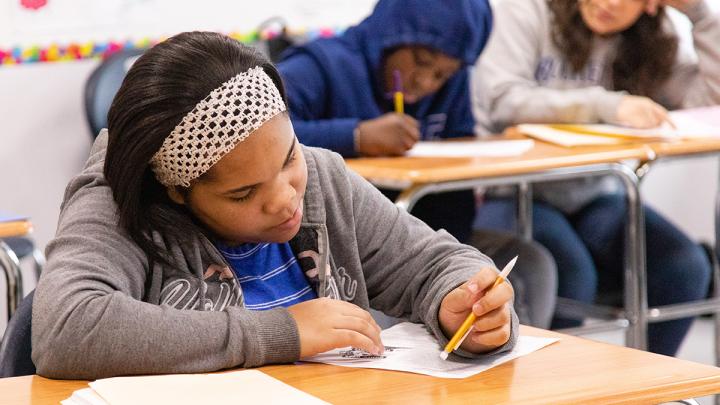
Teaching
EdD Deadlines
Full and Partial Assistantships
Online Learning Options
Full-Time or Part-Time Options
Whether you want to become a teacher educator or faculty in higher education institutions, pursue a leadership role in the teaching profession, or contribute new knowledge about teaching and learning, Warner’s flexible doctoral programs in teaching will help you achieve your goals.
We invite you to check out our doctoral programs, and see how you can benefit from the expertise and support of faculty involved in cutting-edge research and innovative education reform projects, while pursuing your specific interests.
Warner School PhD and EdD programs can be easily customized to meet your specific career goals and interests related to teaching and curriculum. Whether you are interested in specializing in specific subject areas, focusing on a specific age group, or pursuing more general topics like urban education, learning in the digital age, or health professions education, just to name a few, Warner will work with you to help you achieve the goals for your doctoral program.
Key Program Features
- Minimum Credits: 90 graduate credits; some of which can be transferred from previous programs (up to 30 credits for PhDs; up to 36 credits for EdDs).
- Customizable: With only six required courses, it’s easy to choose electives in your specific areas of interest, tailor projects in most courses, and most importantly select your dissertation topic.
- Choice of Research Methods: Benefit from a vast array of research methods courses, and choose from a variety of research methods for your dissertation.
- Exciting Research Opportunities: Warner faculty are always working on exciting research and reform projects that provide opportunities for apprenticeships as well as interesting contexts for your dissertation.
- Flexible: Programs can be completed on a full-time or part-time basis, starting in any semester; minimum one year full-time residency requirement for PhD students only.
Prerequisites
- Prior preparation and experience as an educator.
- Prior master's degree highly desirable; most students will have already completed a master's program.
Scholarships, Tuition & Financial Aid
Many of our full-time doctoral students benefit from full and partial assistantships to support their studies while gaining valuable career experience at the same time.
Questions?
PhD in Education: Teaching and Curriculum
Prepares graduates for academic positions in universities and other higher education settings, as well as research positions in government agencies or other educational organizations. View coursework for the PhD in Education: Teaching and Curriculum.
EdD in Teaching and Curriculum
Prepares and supports experienced educators for leadership positions in their field, as well as selected higher education faculty positions. It can be completed on a part-time basis while maintaining full-time employment.
View the coursework for the EdD in Teaching and Curriculum. You can complete this program in as few as three years by following the prescribed coursework sequence, or opt for a more flexible pace based on your schedule.
Customize Your Degree
Our degrees are designed to meet your interests and career aspirations. Whether you want to add an advanced certificate or specialize in a distinct area of emphasis, we can help craft the best option for you.
Ready to Apply?
EdD Deadlines
Career Opportunities
Warner EdD graduates hold positions such as teacher leaders, department chairs, and curriculum coordinators in K-12 schools; faculty and program directors in a variety of teaching and community colleges; clinical faculty at research universities; as well as other faculty and academic leadership positions.
Warner PhD graduates hold tenure-track and clinical faculty positions in a variety of higher education institutions, including research universities in the United States and abroad as well as faculty positions at four-year colleges, community colleges, and specialized professional schools. Many have pursued academic leadership positions, becoming successful program directors, chairs, and deans at their respective colleges and universities. Some graduates pursue less traditional positions, including roles with not-for-profit education organizations in areas involving program development and evaluation.

Raffaella Borasi
Math education; teacher education; learning in the digital age; entrepreneurship in education
Jeffrey Choppin
Math education; teacher education
Michael Daley
Science education; learning in the digital age
Samantha Daley
Disabilities; inclusion; special education
Meagan Driver
Multilingual education; world languages; applied linguistics
Joanne Larson
Literacy learning; elementary education; urban education; diversity in education
April Luehmann
Science education; teacher education; learning in the digital age; informal learning
Valerie Marsh
English education; literacy learning; urban school transformation
Kevin Meuwissen
Social studies education; teacher education
Martha Mock
Disabilities; inclusion; special education; early childhood education
Hairong Shang-Butler
TESOL; academic writing
Carol Anne St. George
Literacy learning; teacher education
Take a Course Before You Apply
Take a course before you apply to one of our programs for a discounted price. Inquire with admissions to learn about credits that also apply toward degree requirements.
Related advanced certificates
Minimal additional credits required.